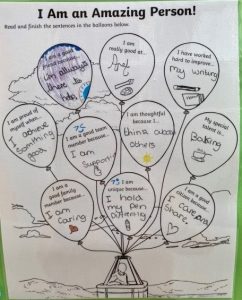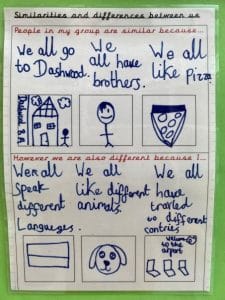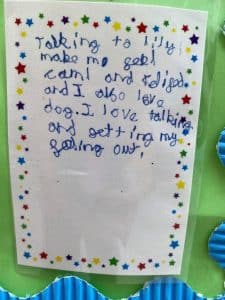PSHE and Wellbeing
PSHE Intent, Implementation and Impact
Intent:
 At Dashwood Banbury Academy, our PSHE, Relationships and Health Education and Mental Wellbeing curriculum equips children with the knowledge and skills to develop healthy and safe friendships and relationships, self-regulate emotions and keep mentally healthy, build self-efficacy to become positive members of society and keep themselves physically safe and healthy.
At Dashwood Banbury Academy, our PSHE, Relationships and Health Education and Mental Wellbeing curriculum equips children with the knowledge and skills to develop healthy and safe friendships and relationships, self-regulate emotions and keep mentally healthy, build self-efficacy to become positive members of society and keep themselves physically safe and healthy.
Our whole school curriculum threads aim to teach the children:
Relationships: i) Know what a respectful relationship is and the sorts of boundaries that are appropriate when being safe (including online relationships in a digital context); develop caring friendships; develop self-confidence and self-awareness; recognise and manage feelings, behaviour and emotions within relationships and understand how to self-regulate; understand how to be respectful and tolerant and value difference within a community. Understand that families and people who care for me are important and respect that other families look different from their own.
Living in the wider world: economic well-being and being a responsible citizen ii) Be aware of their value in the community and being their best; abiding by set rules and laws understanding rights and responsibilities; and understand the impact of money, work and current affairs on their lives.
Health and wellbeing: iii) Know how to stay healthy and look after our body as it grows and changes. iv) Be aware of physical, mental and social dangers around us and know how to protect our wellbeing and keep ourselves safe.
Implementation:
 To ensure that all of our pupils develop a secure understanding of the above, we have developed an extensive and progressive curriculum from Nursery through to Year 6. PSHE is taught through explicit lessons once a week, but is also woven through out many subjects in the curriculum. For example, some Literacy units such as Year 6’s Black History topic incorporate strands i and ii.
To ensure that all of our pupils develop a secure understanding of the above, we have developed an extensive and progressive curriculum from Nursery through to Year 6. PSHE is taught through explicit lessons once a week, but is also woven through out many subjects in the curriculum. For example, some Literacy units such as Year 6’s Black History topic incorporate strands i and ii.
Dashwood’s behaviour policy is based around self-regulation, with The Zones of Regulation being used as our method of developing language around emotions. This supports the mental and emotional wellbeing of children. At Dashwood, we acknowledge how others are feeling and aim to build a positive mind-set in order to tackle problems head on. At the core of what we believe stands our vision and values. We know that emotions are a part of everyday life and self-regulation is the key to being able to realise and live by our vision and values.
We believe that PSHE should be taught in creative and engaging ways, so the children get the optimum experience. Children will not only receive weekly lessons, but will have the opportunity to engage in outdoor learning to encourage cooperation, resilience and creativity. Some children will have the opportunity to engage in small group and 1:1 sessions to support wellbeing. As part of our creative approach, all children will see our school dog, Lily, around the site. Some will be in class with her all day and some will have the opportunity to spend time with her in small groups. Lily’s purpose is to increase the wellbeing of the children.

Impact:
- Pupil voice will show that children have a broad knowledge of the key strands (i, ii, iii, iv). Children will be able to articulate the purpose of PSHE and how it impacts their lives both inside and outside of school.
- Children’s Wellness books will reflect weekly teaching of PSHE, according to medium term plans.
- Children’s work and reflection will show thoughtful responses, indicating a secure and deep understanding of topics.
- Children will be able to articulate how they are feeling, according to the Zone of Regulation and suggest tools they can use to get back in to the green zone where they are ready to learn.
- Pupil voice from Year 6 will reflect the fact that they have a secure knowledge of i, ii, iii and iv as a result of the progressive curriculum.
- Long term plans will show a clear progression of learning from Nursery to Year 6
- Children will learn key skills to keep themselves safe, with focus on key local issues such as county lines, exploitation, misuse of online materials and substance abuse.
- Children who have contact with the school dog, Lily, will be able to articulate how they benefit from seeing her and how they feel when she is visiting.




